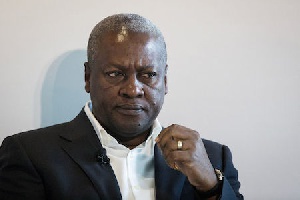Positive results are starting to flow from Ghana's fiscal consolidation plan that includes an aid deal with the International Monetary Fund and a decision by the European Union to renew budget support, President John Mahama said on Friday.
Mahama cited a slowdown in the increase in the inflation rate as an example of improvement and said the currency, which has fallen to a record low against the dollar, was being hurt partly by speculation.
"We are beginning to see the start of fiscal consolidation," Mahama told reporters. He said he intended to run for a second four-year term in 2016 if selected by the ruling National Democratic Congress to face opposition leader Nana Akufo-Addo.
Since Mahama came to power in 2012, the government has faced a fiscal crisis that has seen a slowdown in growth in an economy that had expanded quickly on exports of gold, cocoa and oil.
Inflation rose in May to 16.9 percent from 16.8 percent the previous month, while the currency has fallen at least 22 percent this year on top of a 31 percent decline last year.
What Mahama called a "tight economy" leaves the government open to opposition criticism compounded by power shortages that have angered voters and sapped business confidence.
In addition, 150 people died last week in an explosion at a gas station and floods caused by seasonal rains that exposed the capital's inadequate drains and infrastructure problems.
Given the slate of problems, stabilising the macro economy is fundamental not just to the government's re-election prospects but to helping Ghana, a stable democracy, regain its place as one of Africa's brightest economic prospects.
Mahama took responsibility for the flooding and said the government was taking steps including dredging drains and encouraging people on low-lying land to move to safer ground.
"It is not the time to lay blame and if it is there is enough to go round," he said, citing the "failure of multiple institutions" as a reason why the floods proved so serious.
The European Union on Friday said it would resume budget support of 161.38 million euros ($181.84 million) to Ghana after suspending aid in 2013.
The EU was satisfied with the IMF deal and a government plan to tackle irregularities in the payroll including ghost workers, EU Ambassador William Hanna told Reuters.
"It is a vote of confidence in Ghana. They have satisfied the criteria. We trust that they will stick to the IMF programme," Hanna said. The aid would be money for health, decentralisation and environmental policy reform.
General News of Sunday, 14 June 2015
Source: reuters.com
Mahama says slowing inflation shows fiscal plan working
Entertainment












